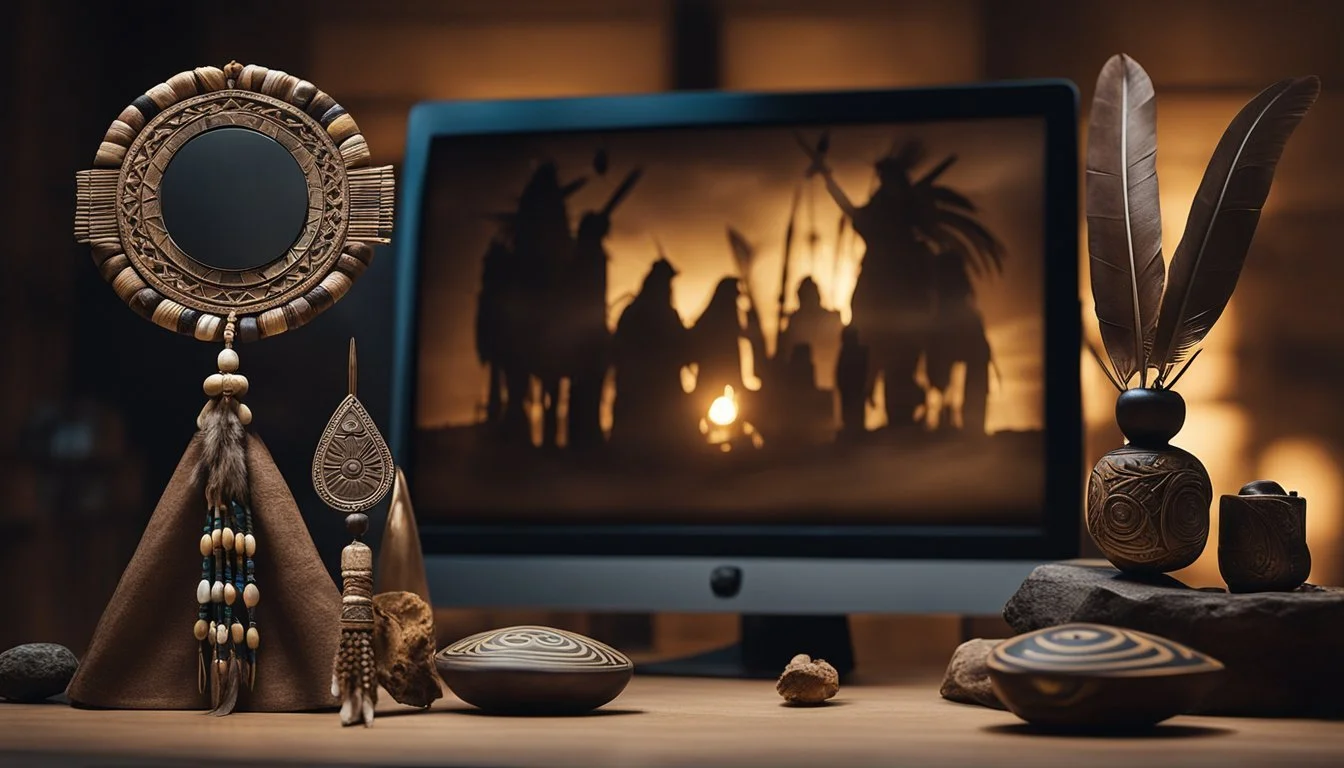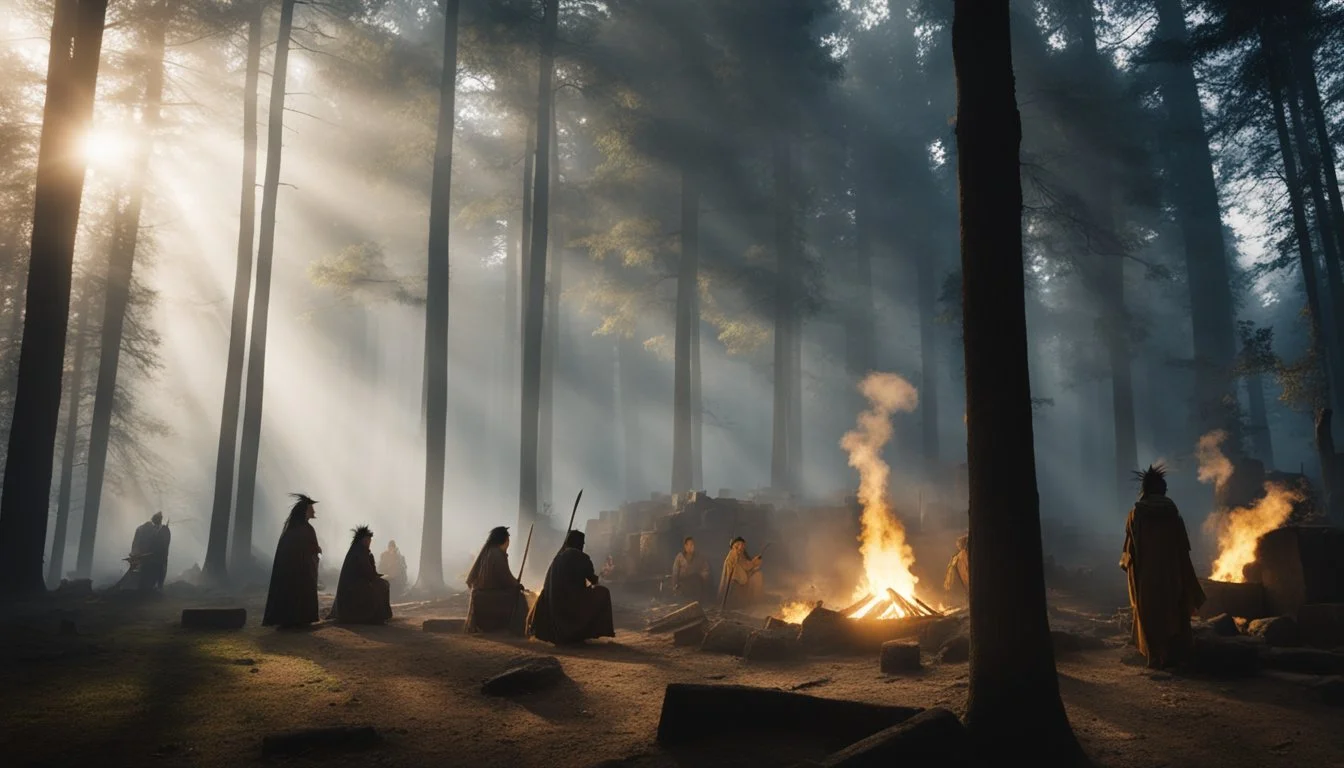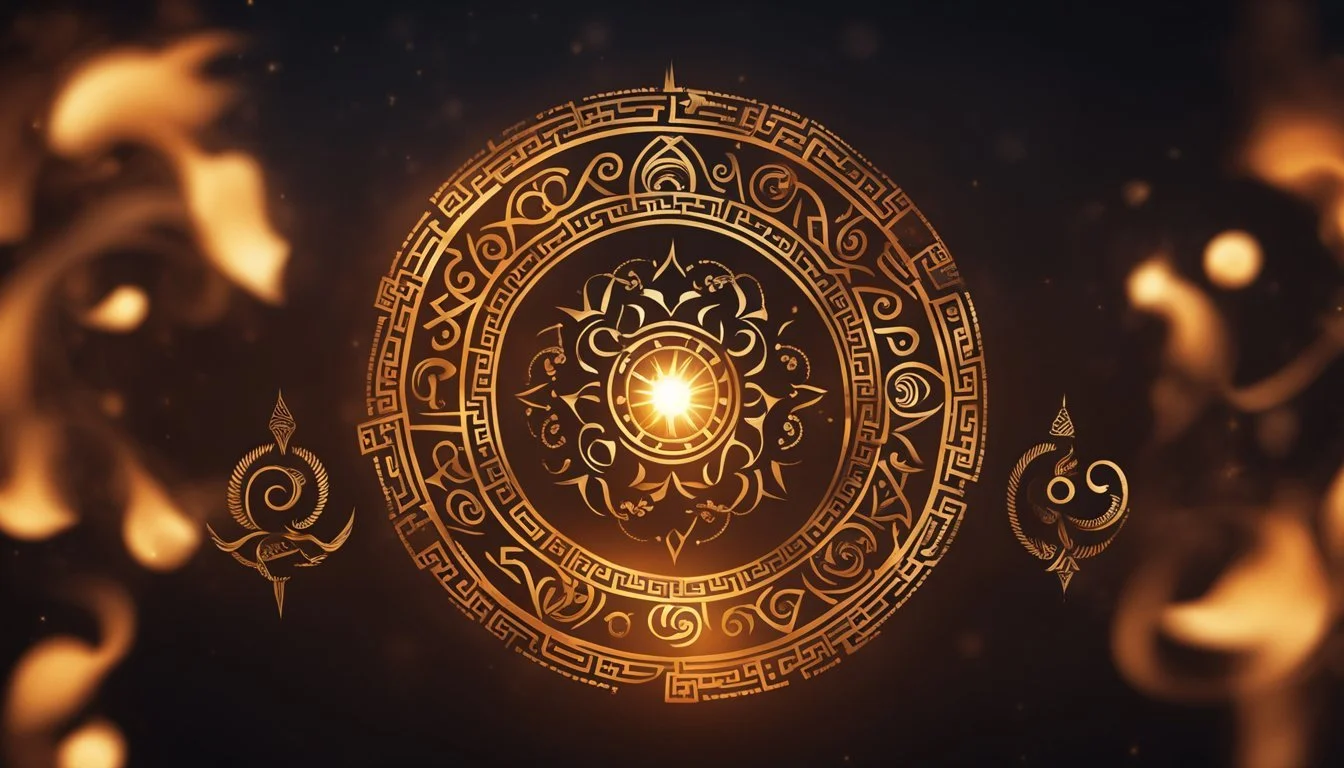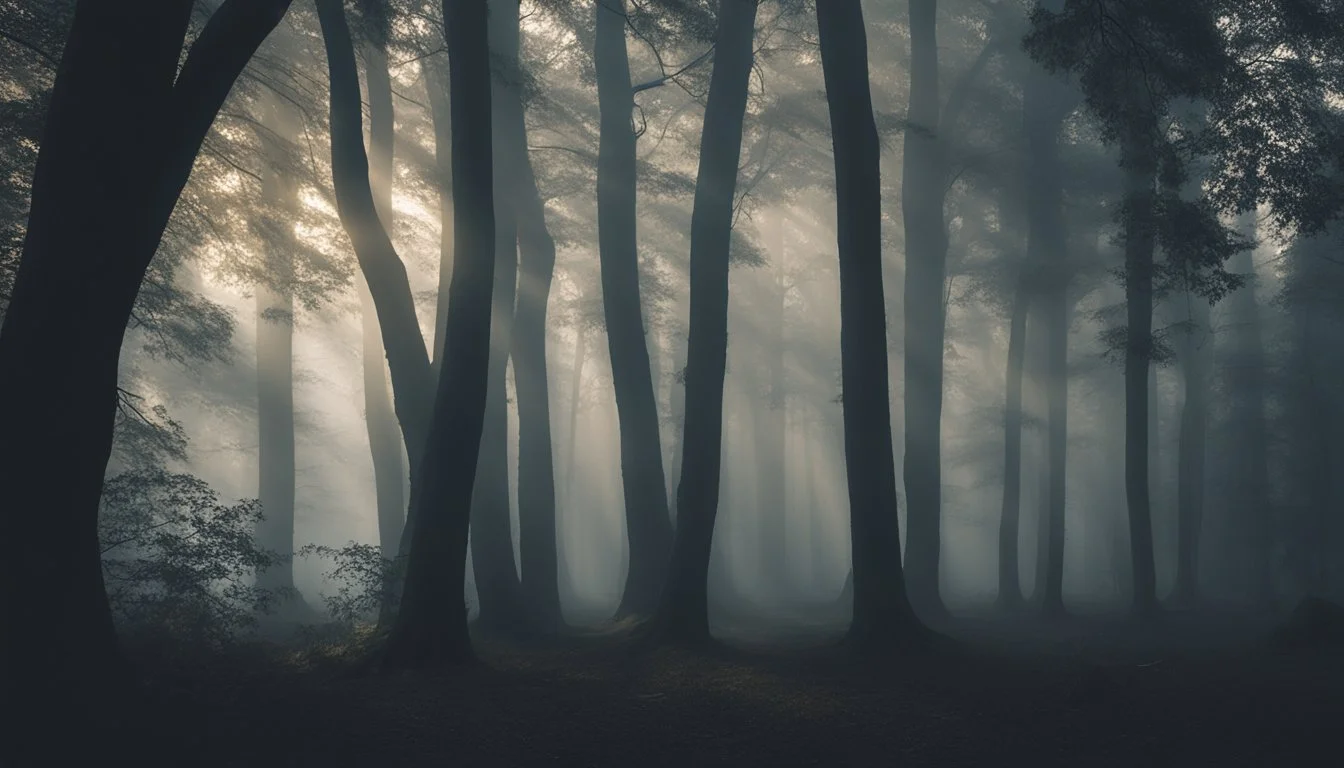10 True Crime Documentaries About Native American Spiritual Practices
Unveiling Mysteries and Culture
True crime documentaries about Native American spiritual practices offer a unique lens into the intersection of cultural heritage and legal systems. These films reveal the complexities faced by Native Americans, who navigate a world where their ancient spiritual traditions often intersect with modern legal challenges.
The exploration of these true crime stories provides valuable insights into how Native American communities strive to preserve their rich spiritual customs amidst various societal pressures. Through these documentaries, viewers gain a deeper understanding of the significance of spiritual practices in Native American culture and the ongoing struggles to maintain these traditions in the face of adversity.
1) The Spirit World: Secrets from Native America
"The Spirit World: Secrets from Native America" (2020) explores the rich spiritual traditions of Native American cultures.
This documentary dives into ceremonies, rituals, and beliefs. It highlights how Native Americans view the spirit world and their connection to nature. Specific focus is given to how these practices have endured and evolved.
Viewers will encounter depictions of sacred dances, chants, and the use of spiritual tools. The film offers authentic portrayals and insights into how elders pass down these traditions. Audiences can gain a deeper appreciation for the spiritual resilience of Native American practices.
The film emphasizes the importance of the spirit world in daily life. It showcases how spirituality impacts everything from healing practices to community decision-making. The documentary provides a window into the sacred and the everyday, blending them seamlessly.
For further details, visit IMDb or Wikipedia.
2) Talking to the Ancestors
"Talking to the Ancestors" (2018) explores the spiritual practice of communicating with deceased tribal members among Native American communities.
The documentary delves into rituals and ceremonies that bridge the living and the dead. These practices are central to many tribes and are seen as ways to gain wisdom and guidance.
Through interviews with spiritual leaders, the film provides insights into the methods used. Drumming, chanting, and meditation are highlighted as common techniques.
The film also addresses the challenges faced by these communities in preserving these ancient traditions. Modern influences and societal changes pose significant threats to these practices.
To learn more, visit IMDb's Talking to the Ancestors.
3) Whispers of the Past (2002)
"Whispers of the Past" explores the deeply spiritual world of the Navajo Code Talkers. This documentary delves into how these Native American soldiers used their language to create an unbreakable code during World War II.
Directed by Valerie Red-Horse Mohl, the film is narrated by William H. Macy. It offers an intimate look at the lives of these code talkers and their unique spiritual traditions. Featuring original Navajo music, the documentary presents the cultural and spiritual backdrop that shaped their contributions.
It underscores the profound connection between their spiritual practices and their sense of duty. The film also highlights the recognition they deservedly received after many years of silence.
For more information, visit IMDb: Whispers of the Past.
4) Ghost Dancers: Unveiling the Mysteries
Ghost Dancers: Unveiling the Mysteries (2021) explores the historical and spiritual significance of the Ghost Dance movement. This documentary delves into how the practice emerged in the late 19th century among Native American tribes, who believed it could reunite them with their ancestors and restore their lands.
Fortified with interviews from historians and Native American elders, the film offers firsthand accounts of the rituals involved. It sheds light on the meaning behind the movements and chants integral to the Ghost Dance.
Visual reconstructions and archival footage enhance the narrative, making it accessible for those unfamiliar with Native American spiritual practices. This documentary offers a compelling look into a pivotal period in Native American history.
Learn more about Ghost Dancers: Unveiling the Mysteries (2021) on IMDb.
5) Echoes of the Plains
"Echoes of the Plains" (2017) delves into the intersection of crime and Native American spiritual practices. The documentary explores the darker aspects of how these practices have sometimes been manipulated or misunderstood, leading to tragic outcomes.
One story featured is that of a Lakota spiritual leader wrongfully accused of a crime. The film meticulously unpacks his journey through the justice system, showcasing how traditional spiritual practices were misinterpreted.
It also provides a broader view of systemic issues affecting Native American communities. In particular, the documentary examines how cultural misunderstandings can have dire consequences for indigenous individuals involved in the legal system.
Through interviews with community members, spiritual leaders, and legal experts, the documentary provides a comprehensive look at the challenges faced. The narrative is both gripping and informative, offering viewers a deep insight into an often-overlooked aspect of Native American life.
For more information, visit IMDB.
6) Rituals of the Western Tribes
The Western Native American tribes, such as the Apache and Navajo, possess a rich tapestry of spiritual practices and rituals. These cultures have deep-rooted traditions that play a significant role in their daily lives and community bonds.
Apache ceremonies often center around rites of passage. The Sunrise Ceremony, for example, marks the transition from girlhood to womanhood. This four-day event includes dancing, singing, and other rituals performed by the entire community. Learn more.
The Navajo perform the Night Chant, a nine-day healing ceremony aimed at restoring balance and harmony. Songs, prayers, and dances are integral to this ritual, which seeks to cure ailments and bring spiritual rejuvenation. Learn more.
The Hopi tribe of Arizona is renowned for its intricate Kachina doll ceremonies. These rituals are intended to invoke the spirits of ancestors and natural forces to ensure rain, fertility, and fortune. They are marked by elaborate dances and the crafting of symbolic dolls. Learn more.
The Shoshone engage in the Sun Dance, a central religious ceremony involving days of dancing, fasting, and praying. This rite is a test of endurance and an expression of gratitude to the Creator. Learn more.
Understanding these Western tribes' rituals reveals much about their worldview, where every element of life is interconnected with the spiritual realm.
7) Shadow of the Shaman (2010)
"Shadow of the Shaman" explores the complex and often misunderstood role of shamans within Native American communities. This documentary provides a deep dive into the spiritual practices and healing methods of shamans, highlighting their significance as mediators between the human and spiritual realms.
The film features interviews with practicing shamans, giving viewers an authentic glimpse into their daily lives and spiritual journeys. It also addresses misconceptions and modern-day challenges faced by these spiritual leaders.
Through intimate storytelling, the documentary sheds light on the sacred rituals and ceremonies performed by shamans, including the use of traditional tools like drums and herbs. Their practices, rooted in centuries-old traditions, aim to bring healing and guidance to their communities.
"Shadow of the Shaman" also touches upon the impact of external influences on these ancient practices. It discusses how commercialization and exploitation by non-Native individuals have affected the authenticity and preservation of shamanic traditions.
An intricate portrayal of Native American spirituality, the film invites viewers to appreciate the depth and richness of shamanic practices. This documentary is essential viewing for anyone interested in understanding the intersection of culture, spirituality, and healing within Native American traditions.
More Information on "Shadow of the Shaman"
8) The Lost Words of the Medicine Man
The Lost Words of the Medicine Man (2007) delves into the ancient and sacred practices of Native American healers. This documentary offers an in-depth look at the role of medicine men in various tribes and the spiritual significance of their healing rituals.
Focusing on interviews with tribal elders and medicine men, the film reveals the intricate knowledge passed down through generations. The discussions touch on the use of herbs, prayers, and ceremonies that are integral to their practices.
The documentary highlights the challenges faced by these spiritual leaders in preserving their traditions amid modern influences and changing times. It emphasizes the importance of oral traditions and how the wisdom of the ancients is vital for the survival of Indigenous cultures.
Through striking visuals and personal stories, The Lost Words of the Medicine Man provides a captivating insight into the lives and practices of these respected healers. IMDB
9) Tribal Spirits: Unseen Forces
"Tribal Spirits: Unseen Forces" (2022) explores the spiritual beliefs and practices of indigenous tribes across North America. The documentary delves into rituals, ceremonies, and the deep connection tribes have with unseen forces they believe guide their lives.
Viewers witness a variety of spiritual practices, from the sacred Sundance ceremony to the cleansing power of smudging rituals. Each segment provides insight into how these practices are intertwined with the tribe's history and culture.
The featured tribes include the Lakota, Navajo, and Hopi. Tribal leaders and elders share their wisdom, explaining the significance of each ritual and the spirits they invoke.
This documentary highlights the resilience and strength of Native American spirituality, despite centuries of external pressure and cultural disruption. It emphasizes the importance of preserving these practices for future generations.
For more information on "Tribal Spirits: Unseen Forces," visit IMDB.
10) Haunting Histories: Legends of the Native Spirits
"Haunting Histories: Legends of the Native Spirits" (2022) explores the spiritual legends passed through generations of Native American tribes.
The documentary delves into stories of spirits integral to Indigenous culture.
From the Navajo Skinwalkers to the Lakota's Ghost Dance spirits, these legends reveal the profound connection between tribal communities and the spirit world.
Interweaving personal testimonies and historical accounts, this film brings ancient lore to contemporary audiences.
The filmmakers take care to respectfully present these stories, ensuring authenticity and cultural sensitivity.
Expert interviews provide additional context, shedding light on how these spirits influence Native American beliefs and traditions today.
"Haunting Histories" offers a captivating look at how spirituality shapes and sustains Indigenous communities.
For further details, see IMDB.
Historical Context
Native American spiritual practices have been deeply influenced by various historical events. This section explores the effects of colonialism and modern efforts to revive and preserve these spiritual traditions.
Colonial Impact on Native American Spiritual Practices
Colonialism had a profound effect on Native American spiritual practices. European settlers enforced policies that aimed to suppress indigenous religions.
Missionaries introduced Christianity to Native American communities, leading to a decline in traditional spiritual practices. Furthermore, laws and policies like the Indian Boarding Schools sought to assimilate Native Americans, banning ceremonies and rituals.
Loss of land was another significant factor. Sacred sites were appropriated for colonial use, disrupting the practice of rituals tied to specific locations. These actions eroded the cultural fabric of many tribes, leading to a loss of identity and spiritual connection.
Revival and Preservation Efforts
In recent decades, there has been a concerted effort to revive and preserve Native American spiritual practices. Legislation such as the American Indian Religious Freedom Act (1978) recognized the rights of Native Americans to practice their indigenous beliefs.
Various communities have taken initiatives to document and pass down traditions. Elders play a key role in this process, teaching younger generations about sacred rituals, ceremonies, and spiritual practices.
Cultural and spiritual gatherings, such as powwows, have become instrumental in this revival.
Organizations also work to protect sacred lands from development, ensuring that these important sites remain accessible for spiritual practices. Through these efforts, many Native American communities are seeing a resurgence in cultural pride and spiritual practice.
Common Themes in True Crime Documentaries
True crime documentaries about Native American spiritual practices often highlight significant thematic patterns. These documentaries frequently tackle issues of misrepresentation and stereotyping while emphasizing the cultural significance of spiritual rituals and practices.
Misrepresentation and Stereotyping
Misrepresentation and stereotyping are prevalent themes in true crime documentaries focusing on Native American spiritual practices. These documentaries often reveal how media and law enforcement have historically misunderstood or misrepresented Native American rituals.
Commonly, Native American spiritual practices are wrongly depicted as superstitious or occult.
This misrepresentation can lead to public misconceptions and unjust legal actions against practitioners involved in traditional ceremonies. Documentaries serve to correct these biases, highlighting the need for accurate portrayals. Real-life cases often illustrate the damaging effects of these stereotypes on Native American communities, emphasizing the importance of cultural competence in investigation and media reporting.
Focus on Cultural Significance
The cultural significance of Native American spiritual practices is another common theme. True crime documentaries often explore how these practices are integral to the identity and community cohesion of Native American tribes.
Such documentaries showcase the deep-rooted significance of rituals, ceremonies, and spiritual gatherings.
They frequently highlight how these practices are passed down through generations, serving as a bridge between the past and present. By doing so, documentaries underscore the importance of preserving cultural heritage amidst external pressures and misunderstandings. This focus provides viewers with a better appreciation and respect for the spiritual traditions of Native American communities.
Ethical Considerations
When addressing true crime documentaries focusing on Native American spiritual practices, ethical considerations are paramount. This includes ensuring respect and sensitivity in both the filmmaking process and the inclusion of authentic Native American voices.
Respect and Sensitivity in Filmmaking
Filmmakers must approach the subject matter with outmost respect. Documentaries should avoid sensationalism and exploitation of Native American cultures. This involves distancing from stereotypes and ensuring that the portrayal of spiritual practices is accurate and respectful.
Consent is crucial. Filmmakers need to obtain explicit permission from communities and individuals involved. Misrepresentation or distortion of cultural elements not only harms the depicted community but also misinforms the audience.
Additionally, cultural context is essential. Filmmakers should provide adequate background information to enable viewers to appreciate the cultural significance of the practices depicted. This can help in combating any biases or misconceptions.
The Role of Native American Voices
Native American voices should be front and center in documentaries about their spiritual practices. Their perspectives ensure authenticity and deepen the narrative's integrity.
Involving Native American consultants and advisors in the filmmaking process can guide the ethical representation of cultural practices. They can help in ensuring that the portrayal aligns with community values and traditions.
Interviews and first-person accounts from Native American participants enrich the narrative and provide insights that are both accurate and deeply personal. This not only empowers the community but also educates viewers with genuine, lived experiences.










